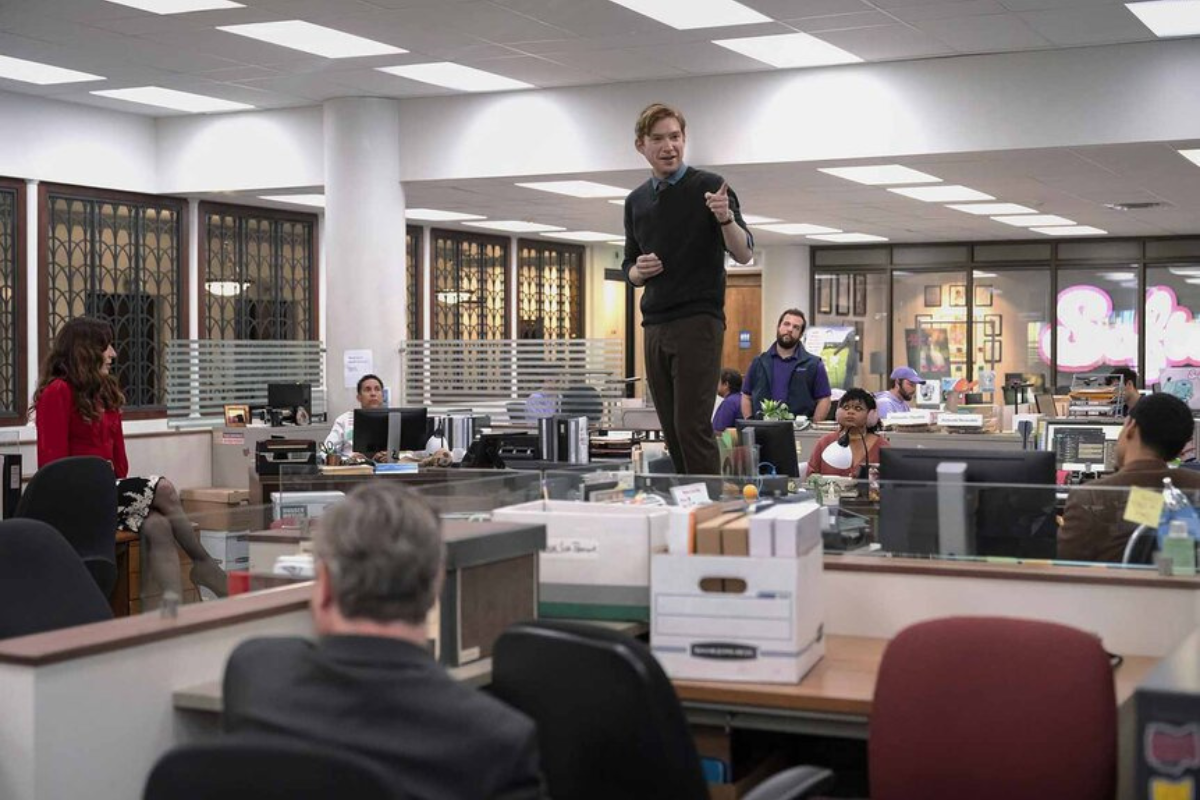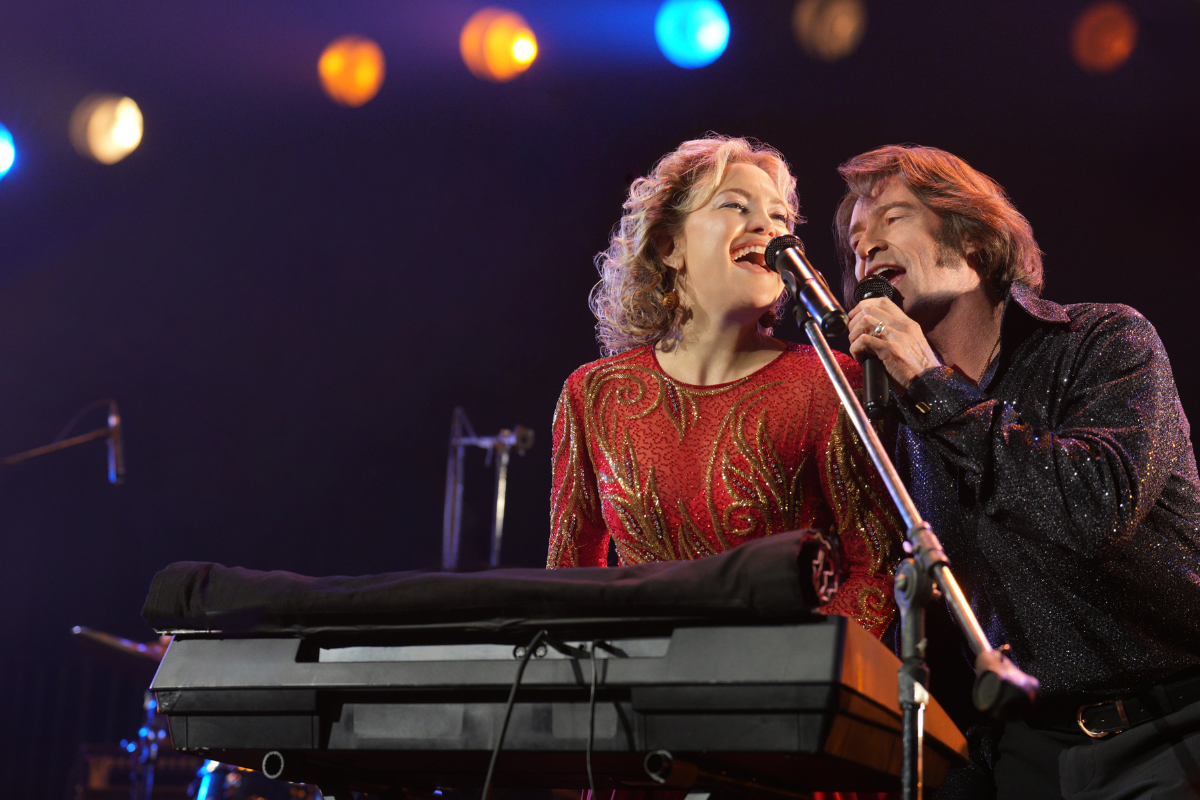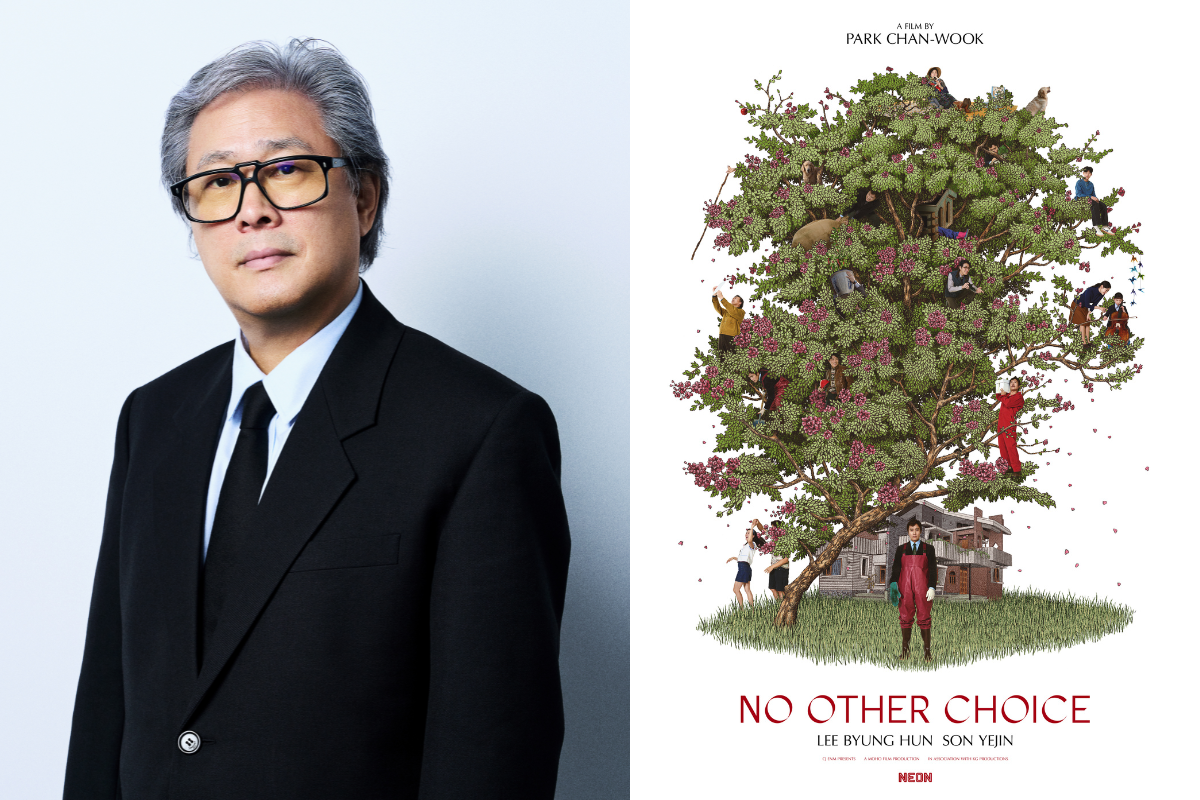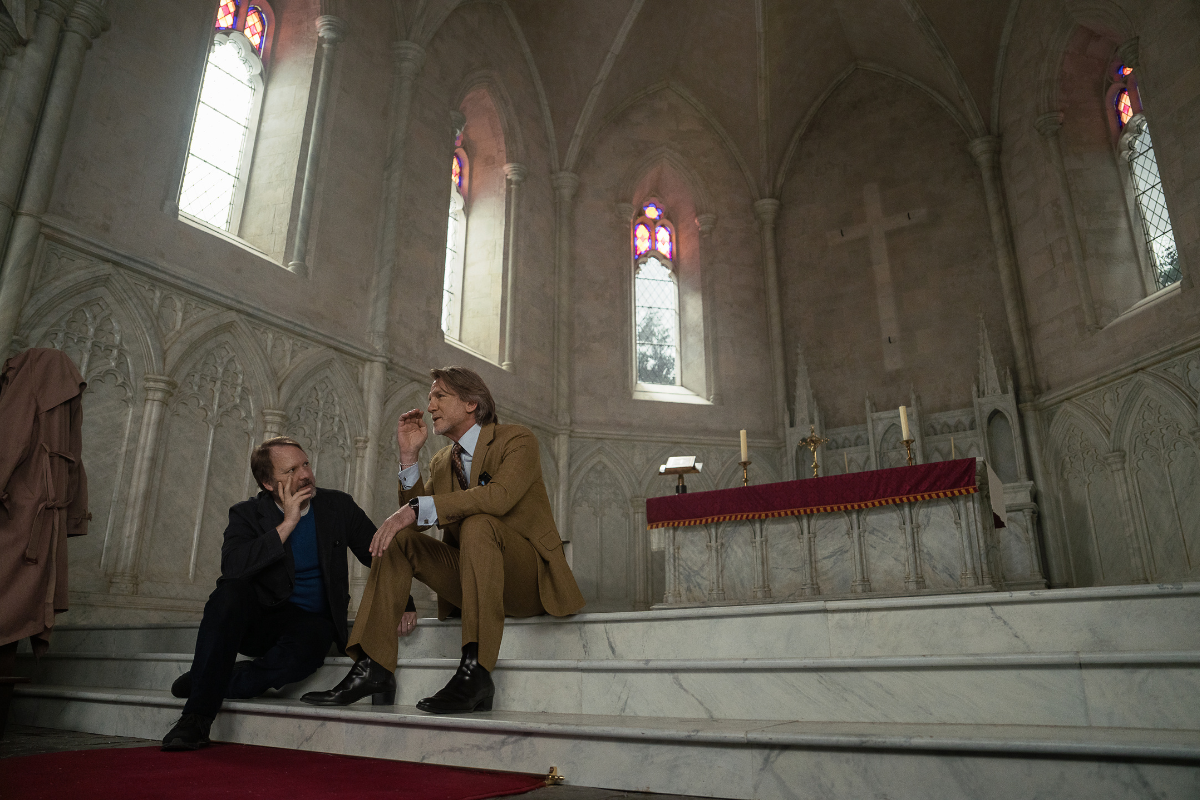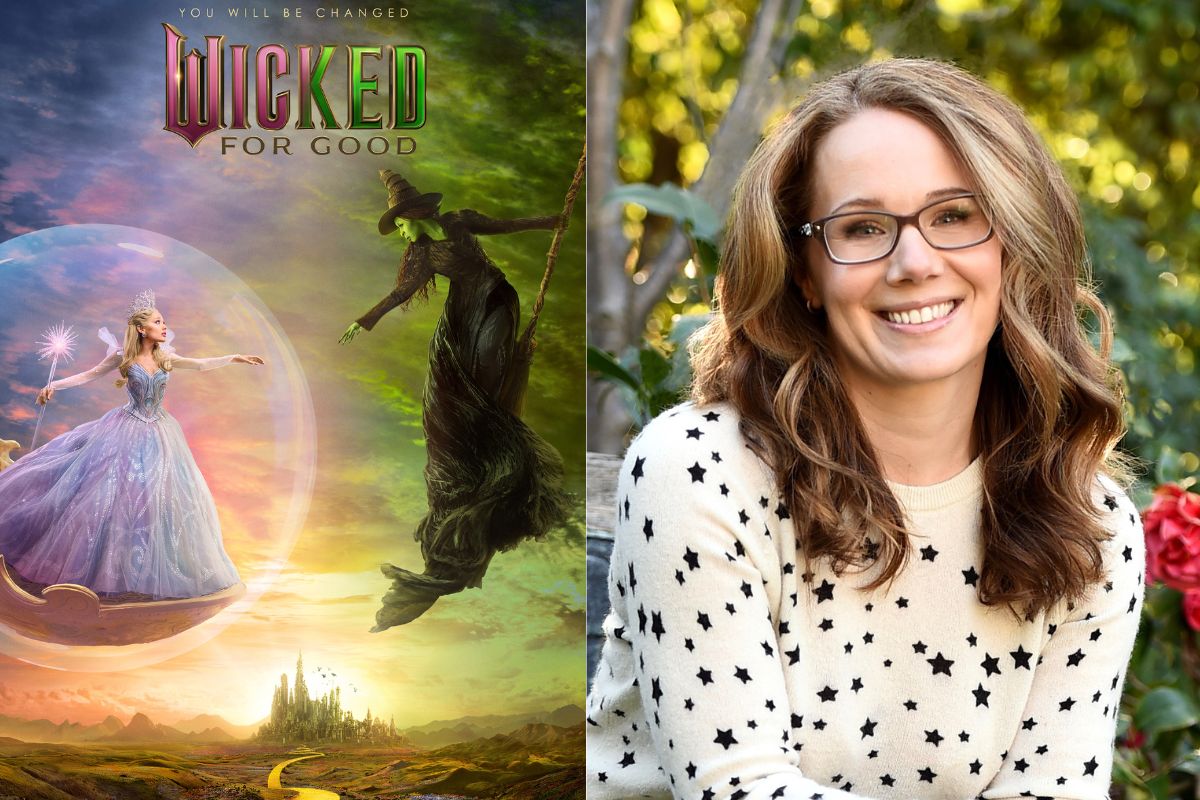Capturing an Intimate Creative Process: An Interview with ‘Anonymous Club’ Documentary Filmmaker Danny Cohen
Filmmaker Danny Cohen speaks with Script about changing creative gears from music video collaborations with musician Courtney Barnett to filming a documentary with her as the main subject, how he was able to capture rare emotional moments with a Dictaphone, and filming a scene that later became a tender and poignant resolution for the film.
Shot on vivid 16mm film over a three-year period, ANONYMOUS CLUB chronicles notoriously shy, Melbourne-based musician Courtney Barnett’s ups and downs on the world tour for her album Tell Me How You Really Feel. Featuring Barnett’s unguarded narration from her audio diary, recorded on a dictaphone provided by filmmaker Danny Cohen, the film delivers frank and unprecedented insight into Barnett’s creative process, the sacrifices and inner conflicts set in motion by fame, and the sometimes dark backdrop to her whimsical, relatably poetic compositions.
The film gives a rare and beautifully candid captured glimpse into a relatively shy artist and musician Courtney Barnett's creative process. Courtney's voice and reserved presence is delicately handled by filmmaker Danny Cohen's direction and fly on the wall "attitude." This film speaks volumes for music lovers, Courtney Barnett, fans, musicians, artists, and the like - thanks to the tender moments dictated by Courtney via her Dictaphone.
I had the great opportunity to speak with filmmaker Danny Cohen about changing creative gears from music video collaborations with Courtney to filming a documentary with her as the main subject, how he was able to capture rare emotional moments with a Dictaphone, and filming a scene that later became a tender and poignant resolution for the film.
This interview has been edited for content and clarity.
Sadie Dean: Before this documentary, I know that the two had collaborated on music videos, but entering the documentary space, it's definitely a different beast in building that intimacy and a safe space. How did you build that relationship with her to develop this into a documentary?
Danny Cohen: I don't know if it was a conscious effort to build that sort of relationship or trust. I think for a long time, we've kind of bonded over the creative process, and what drives us and why. And we kind of look to a lot of different artistic signposts heroes along the way that helped us. I think it was just time and me being around enough and kind of exposure therapy [laughs] and having me in the room. I think once the Dictaphone came into fruition, we obviously just became closer because Courtney was sharing so much. And I was responding when I could or when I thought it was appropriate or responding through filming. But also, after a while, it was actually triggered by a Dictaphone entry that she left for me saying that she's really nervous that we might have a fight, or we might have some weird falling out. And I think her line was like, ‘You're gonna share this with the world and be like, hey, everyone, look at the look how stupid Courtney is or something,’ she had that sort of fear of that I'm just going to release it all into the wild. I knew it was just her joking with me, but at the same time, I was like, ‘OK, maybe I need to share more of me.’
I started to keep a Dictaphone for her not to go into the film, but just as an exercise and not super consciously of like, ‘OK, I need to make Courtney trust me,’ it was more just like, well, it's a two way street type thing. And then when I was doing it, it is just so difficult to sit in a room and hear your voice echo and talk about your day and the ups and downs and what you went through to get through a certain situation, that when you say it out loud, it feels so trivial and so silly, but you still felt it. It still means something to you.
She'd been doing this for like a year already, and she embraced it. I can't even explain how much more she embraced it than I thought she would, you know, it's just incredible. I was never sure what I was going to get there. And she just did it with full gusto. And, obviously, that's what helps the film really go deep and for people to connect.
Sadie: Yeah, that's interesting that you bring that up, the idea of her questioning, even jokingly, ‘Are we going to have a falling out? Are you going to turn on me?’ And we get this glimpse into her mindset that's on the top of her mind - that idea of loss and being lost and being disconnected. And then she comes full circle where she gets to reconnect with her music and being with her fellow musicians, which I think is something a lot of artists can relate to. Going off that, was that kind of the journey that you saw for the film, this this was how her story would arc in finding her voice again?
Danny: Yeah, I mean, I knew that arc existed maybe a year to year and a half into filming, I didn't see the upturn that we see in the film. But it almost felt like if you listen to Tell Me How You Really Feel, that record, it is a pretty dark record. And it is angry, and she's frustrated. And it is dealing with a lot of bigger issues or it's her trying to process a lot of things. So, I think naturally, that mood hadn't disappeared. She was still, I don't want to say she was angry, and I don't want to speak on behalf for her in that way, but her outlook was maybe a bit more jaded at that time. And so, you can kind of really feel that just through the energy of the shows. And obviously, she was in a great mood, but it was up and down, up and down all the time.
Overtime, you just started to see a change in her outlook. And I think that solo tour is what really helped her understand everything a little bit more. She mentions it in the film that because it's just her on the stage, her and a guitar and the audience - she's forced to connect, and she's forced to be comfortable in those situations. Before, you can kind of hide behind your band members, or you can hide behind a wall of sound, and like huge guitar and all that sort of stuff. And now it's just her.I think that just triggered a lot and then mix in forced time off with a pandemic - a lot of thinking time.
Sadie: I'm curious about the production timeline, from picking up your camera, handing her the Dictaphone to filming the last shot.
Danny: Yeah - her third album, Things Take Time, Take Time - she was recording that, and as she was writing that it, you could obviously see through her art that her outlook had shifted as well. And so that's why I felt like it was the right time to sort of bookend and finish the documentary around that time, because we'd started just before the Tell Me How You Really Feel record had come out. So that was March 2018, is when that record came out. I think she started recording Dictaphone in February 2018. And I finished filming pretty much right up until the edit. I knew we had an edit date set, which was around March or February 2021 - I finished up over that Australian summer, knowing we were going to the edit and I was just trying to get as much as I could and have that sort of recording process leading up to it. And then the edit was about four months. It's been four years now or longer.
Sadie: Quite the journey. That's incredible. And then the creative choice to shoot this entirely on film. Was there something intrinsically important to you as a filmmaker to captur this story and that intimacy on film?
Danny: I love the medium. I find it very natural, and very immersive. And I think it feels super realistic to me, it obviously feels like a memory. But I think that's just due to nostalgia or something like that, or the way it's been seen in recent years. But it definitely has always had a place in cinema as that sort of standard. So, there was just something about that. It was so difficult to do it physically, on your own and I hadn't done it before, and all that sort of stuff. But then every time you get the footage back a few months later, you're blown away by the pictures, because the way it renders color and tonality, and obviously, the grain too, it just really pulls you in. And for me, I would love watching those pictures come back. I don't think it was necessarily digital versus film, but there's just something less artificial and less scientific.
Sadie: There’s also that dreaminess of it with that texture.
Danny: Yeah, right.
Sadie: Were there any films or documentaries, documentary filmmakers or other artists that were influencing how you were approaching this yourself as a director and her as the subject?
Danny: Early on, I kind of decided not to watch a lot of documentaries going into it. I'm not a massive documentary film buff; it's not really my go to genre. But I just knew that if I started to watch a bunch, I'd probably get really inspired slash influenced. I was like, I think the best way to do it is I'll just make a documentary the way I think I can make a documentary. And it will be its own thing, whatever that is, whether it's original or not. But I'll just try.
The main film that I looked at going into it was more just from Courtney and I talking about how it could work, which was the film Bob Dylan: Don't Look Back. And that was more fly on the wall, but again, there's no interviews or talking heads or anything like that. So, this whole story is told on camera, and liked the idea of that, but with Courtney's Dictaphone to help narrate the story, as well. I didn't really watch any films past that.
In the editing process, I started to watch a lot more. I was just trying to find the pace and the rhythm of the film, because it is quite slow, and I wanted it to be meditative. And I wanted it to kind of wash over and I didn't want it to rush. But also at the same time, you're like trying to capture the chaos of a tour and how quick it is. So, it's trying to find a middle ground there. Our editor Ben Hall watched quite a bit of Tokyo-Ga, the Wim Wenders film, where he goes to Japan and it's kind of retracing Ozu's steps. It's a similar sort of vibe, it's shot on film, and there's a lot of sort of staticky shots and you just sit and watch a scene unfold in his narration and there's just something that washed over you and you kind of got immersed in the scene, but they didn't last too long either. So, there's kind of these little snippets and nuggets that you just sit in, and you can just move on to the next thing, but you can be quite reflective in those moments. And I was really trying to find that sort of pace for the film.
Sadie: Yeah, I appreciate the creative decision behind not including talking heads, I think you'd lose that essence of it being her singular voice through the whole film. And I'm sure for her, it was a very therapeutic cathartic process at the end of the day. Has she seen the film with you at all?
Danny: Yes, she watched a final cut, which, you know, it was a difficult watch. Because she likened it to like having a diary that you kept and you said something three years ago on a whim on a night that you just were feeling not that great. And then the next day, you were totally fine, and kind of forgot about it. But then three years later, someone's like, ‘Hey, this is what you said.’ And a lot of people are going to hear this as well. It's just terrifying, because she's like, ‘I feel like, I'm the same person. But I've grown so much since then and every day or even from that next day of when that happened.’
She understands that it's there to help tell the story. And it is what happened. But it's just really difficult for someone who's quite shy to have that all sort of played back to you. But she also, her and Stella, soundtracked the film as well. And the idea behind that was I set them up in a studio with a projector and they played along Neil Young Dead Man style where they're just reacting musically and emotionally to the images and the story. So, she was exposed to it quite a bit then, which I think was really good.
Sadie: The fact that she also did the score, is such another great layer. At the same time, I can’t imagine watching yourself in an awkward moment and trying to re-capture how I felt musically. [laughs]
Danny: [laughs] Yeah, exactly.
Sadie: There’s one scene that really stood out to me – which was the young fan from China, who told her that the lyrics to a specific song were ‘his life’ and asked her to write the lyrics on his back, but she couldn’t remember all of her lyrics, so he had to recite them to her. It’s such a wonderful moment.
Danny: His name was Bobby - there's so many meet and greets - but he just kind of stood out as the perfect fan or something. He was so humble and so sweet, and so respectful. I think that scene just says so much in terms of like, is Courtney tired these lyrics? Or is she just not the stereotypical rock star that knows all their own lyrics, you know, outside of playing? I kind of bookended the film with that.
It's a really sweet one and there's a moment with Courtney's hand on his back kind of supporting and there's this really nice intimacy - the relationship between fan and artist and then obviously at the end of the film, we kind of revisit that. You film those and you have no idea what it's for. It's just like, ‘This is a fun scene. I don't know, he's really charming and lovely.’ But it's only when you get to the edit room, you're like, ‘Oh, this actually has so much more meaning to it.’
ANONYMOUS CLUB is available in limited Theaters on July 15, 2022.
Learn more about the craft and business of screenwriting from our Script University courses!
Sadie Dean is the Editor of Script Magazine and writes the screenwriting column, Take Two, for Writer’s Digest print magazine. She is also the co-host of the Reckless Creatives podcast. Sadie is a writer and filmmaker based in Los Angeles, and received her Master of Fine Arts in Screenwriting from The American Film Institute. She has been serving the screenwriting community for nearly a decade by providing resources, contests, consulting, events, and education for writers across the globe. Sadie is an accomplished writer herself, in which she has been optioned, written on spec, and has had her work produced. Additionally, she was a 2nd rounder in the Sundance Screenwriting Lab and has been nominated for The Humanitas Prize for a TV spec with her writing partner. Sadie has also served as a Script Supervisor on projects for WB, TBS and AwesomenessTV, as well as many independent productions. She has also produced music videos, short films and a feature documentary. Sadie is also a proud member of Women in Film.
Follow Sadie and her musings on Twitter @SadieKDean


